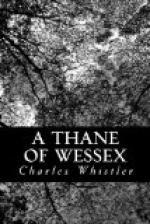Then I gave the standard into Wulfhere’s hand, and must seek one to go with me. First I thought of Wislac, but he was a stranger, and then my eyes lit on my collier, and I knew that I need go no further. So I called him, and taking him aside—while the men streamed past us, looking at my silver arms and speaking thereof to one another—told him what we had to do.
Whereat his eyes sparkled, and he said that it was good hearing.
“But, master,” he went on, “take off those bright arms of yours and let us go as marshmen. Then will be no suspicion if the Danes see us from across the water.”
That was wise counsel, and we left our arms in a baggage wagon, borrowing frocks from the churls who followed us, and only keeping our seaxes in our belts.
Then Dudda found a horse that was led with the wagons, and I bade the man whose it was lend it to him, promising good hire for its use. And so we two rode off together across the marshland, away by Burnham, while the levy held on steadily by the main road.
Then was I glad that I had brought the collier, for the marsh was treacherous and hard to pass in places. But he knew the firm ground, as it were, by nature, and we went on quickly enough. Now and then we passed huts, but they were empty; for away across the wide river mouth at Burnham, though we rode not into that village, we could see the six long black ships as they lay at Stert, and the smoke of the fires their guard had made on shore.
But on this side of the river they had been, for Burnham was but a heap of ashes. They had crossed in their small boats, doubtless, and found the place empty.
Then at last we came to a hut some two miles off in the marshes from Combwich, and in that we left our horses, giving them hay from the little rick that stood thereby. To that poor place, at least, the Danes had not come, for the remains of food left on the table showed that the owners had fled hastily, but in panic, and that none had been near the place since.
Now Dudda would have us take poles and a net we found left, on our shoulders, that we might seem fishers daring to return, or maybe driven by hunger to our work. For we must go unhidden soon, where the marshland lay open and bare down to the river, the alder and willow holts ceasing when their roots felt the salt water of the spring tides. But we had been able to keep under their cover as far as the hut.
So we went towards the river, as I had many a time seen the fishers go in the quiet days that were past; and we said little, but kept our eyes strained both up and down the river for sign of the Danes.
But all we saw was once, far off on Stert, the flash of bright arms or helm; and there we knew before that men must be.
On Combwich hill was no smoke wreath of the outpost fires I had feared, nor could I see aught moving among the trees. Then at last we stood on the river bank and looked across at the little haven. All the huts were burnt and silent. There were many crows and ravens among the trees above where they had stood, and a great osprey wheeled over our heads as we looked.




